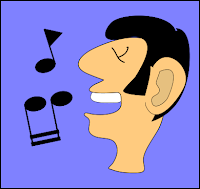 American Idol's latest run began last night. That television show is very interesting to me and my wife. For one thing, the show has discovered some incredible singing talent. Then there's the human interest: it takes a lot of guts to stand before four entertainment professionals and sing without instrumental accompaniment. Some singers are excellent and others are just plain terrible -- you have to wonder what they were thinking when they decided to try out. Self-delusion runs rampant as off-key warbling echoes off the walls, followed by the shock of coming face to face with reality. The next Michael Jackson learns he had better keep his job at McDonald's for the time being.
American Idol's latest run began last night. That television show is very interesting to me and my wife. For one thing, the show has discovered some incredible singing talent. Then there's the human interest: it takes a lot of guts to stand before four entertainment professionals and sing without instrumental accompaniment. Some singers are excellent and others are just plain terrible -- you have to wonder what they were thinking when they decided to try out. Self-delusion runs rampant as off-key warbling echoes off the walls, followed by the shock of coming face to face with reality. The next Michael Jackson learns he had better keep his job at McDonald's for the time being.I've noticed, however, sure signs of a singing disaster in the making:
1. The candidate screams his song, in the apparent belief that volume equals quality.
2. The candidate wears a ridiculous costume, which is the same as wearing a sign around the neck saying "I CAN'T SING A NOTE!"
3. The candidate is cock-sure and confident that he or she is the next American idol and can outsing anyone previously on the show -- proving only that he's too dumb to know how little he knows.
The best way to avoid self-delusion is to record oneself singing and listen to the recording. Are you on key? If you can't tell if you're on key, you can't sing -- fugeddaboutit. Having a good ear goes hand in hand with developing a singing voice. Even if you're singing on key, your voice may not have a great range or great timbre and quality. You might be good enough for a local band but not good enough to make records, in which case you may want to forgo the humiliation of American Idol and try for local gigs instead.
People with a vested interest -- your paid voice coach, your mom, your siblings -- are not the most objective sources of feedback. Seek out other singers and musicians and ask for brutally honest feedback. It may be painful but it will help you to either to develop your voice or to stop wasting your time. By the way, many people can indeed learn to sing. It takes practice and instruction, like learning to play an instrument. Regular feedback, however, is essential.
There are ways to practice singing on your own: use karaoke software. This software is available online, cheap or sometimes free, and you can purchase karaoke songs to play in it. The software plays the music and scrolls the lyrics on your computer screen, and you provide the singing voice.
If you have some recording software, you can simultaneously record your practice session and play it back. What you get is a recording of a band expertly playing the music that you sing to. Now you really do have a means of providing feedback: you can listen to the song to see if you are on key throughout. You can email the sound file to trusted associates for comment, or post it on newsgroups for like-minded singers to listen to and comment on. Now you are getting the feedback you need!
Does the process work? I think so. I have heard some associates greatly enhance their singing voices using this method. It's cheap, easy and best of all, private -- no one gets to listen to your warbling until you feel you're ready.


No comments:
Post a Comment